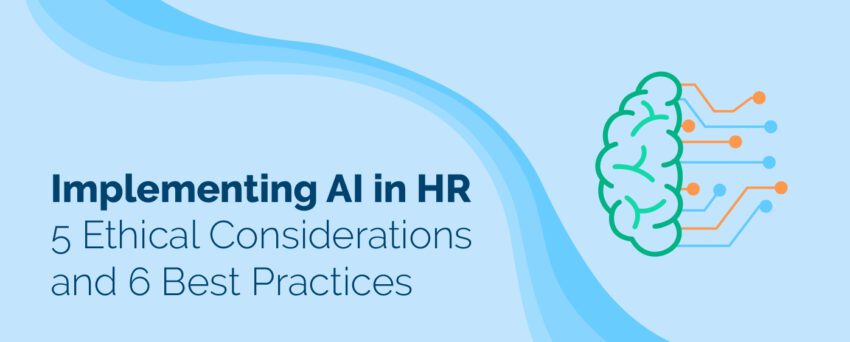11Apr 2025
Artificial Intelligence (AI) is revolutionizing the Human Resources (HR) industry, with AI tools improving speed and precision in HR functions. From screening resumes to tracking employee performance to incorporating predictive analytics for recruitment, AI is transforming HR processes. The implementation of AI, however, raises significant ethical considerations for HR teams to address to ensure fairness, transparency, and compliance in their organizations.
Whether you’re an HR professional or a business owner, understanding the nuances of ethical AI in HR, best practices for implementation, and actionable strategies to ensure responsible and effective use of AI-powered tools can transform your approach to talent management.
The Growing Role of AI in HR
AI-driven tools are integral to modern HR strategies during the recruiting, onboarding, performance management, and employee engagement stages. By streamlining processes, enhancing decision-making, and enabling personalized employee experiences, AI is continuing to reshape the HR landscape. It’s critical for companies to understand the potential impact of AI on the workforce and ensure these innovations are implemented thoughtfully and ethically.
AI is reshaping HR operations in a number of ways:
- Recruitment Automation: Chatbot functions and Applicant Tracking Systems (ATS) help to spearhead candidate screening, scheduling, and engagement.
- Performance Analytics: HR teams can use real-time data to track employee performance and create more personalized reviews.
- Workforce Forecasting: AI predicts future workforce needs by analyzing business growth trends and patterns.
- Learning and Development: Adaptive learning platforms create career development programs tailored to employees.
According to a recent Global CEO Study by PwC, nearly 79 percent of Canadian CEOs will adopt AI in the next 12 months. As HR teams continue adopting AI tools in the future, the concerns surrounding bias, data privacy, and employee autonomy should be addressed.
5 Ethical Considerations of AI in HR
 While AI has the potential to streamline HR processes and improve decision-making, it also raises concerns about fairness, transparency, and accountability. These critical ethical considerations directly impact trust between employers and employees, which can ultimately affect workplace culture and compliance in the long term.
While AI has the potential to streamline HR processes and improve decision-making, it also raises concerns about fairness, transparency, and accountability. These critical ethical considerations directly impact trust between employers and employees, which can ultimately affect workplace culture and compliance in the long term.
Here are five HR ethical challenges to consider before implementing AI:
1. Bias and Discrimination in Algorithms
AI operates on data. If the training data contains bias, the resulting models may amplify discrimination. For example, Amazon’s now-shelved AI recruiting tool reportedly discriminated against women because it relied on data from male-dominated industries.
Mitigation Strategy: Use diverse and representative datasets. Routinely test algorithms for bias.
2. Data Privacy and Security
HR tech involves using sensitive employee data such as performance metrics and personal backgrounds. This may raise concerns about ethical storage and the usage of such data.
Mitigation Strategy: Comply with data protection regulations. Limit access to sensitive employee information and secure the encryption of employee data.
3. Loss of Human Oversight
While AI can streamline essential HR processes, there is a risk of becoming overly reliant on AI algorithms when humans best assess certain nuanced factors. For example, cultural fit or alignment of values during recruitment.
Mitigation Strategy: Balance AI recommendations with human judgment. Train HR teams to evaluate AI outputs critically.
4. Transparency and Explainability
Because AI algorithms generally operate within a “black box,” certain generated AI decisions can become difficult for HR teams to understand and explain. Candidate scoring, for example, should be transparent.
Mitigation Strategy: Choose AI solutions offering explainable algorithms. Communicate clearly with employees about how AI is being used to maintain trust and accountability.
5. Job Displacement and Employee Morale
As AI adoption begins to automate essential administrative tasks, job security becomes a fearful topic among employees. This could lead to resistance to AI implementation and a negative impact on morale.
Mitigation Strategy: Offset the impacts of automation. Reallocate employees to more strategic roles, and maintain an open line of communication about how AI adoption is being implemented in your organization.
Foster a culture of trust and adaptability by proactively addressing job displacement and prioritizing transparency in your organization. Ensuring employees feel valued and supported through the adoption of AI mitigates potential resistance, while also building a more resilient and forward-looking workforce.
6 HR Best Practices for AI Implementation
By adhering to the best practices and addressing potential challenges, organizations can ensure that AI solutions enhance efficiency, improve decision-making, and foster a positive workplace environment. While challenges exist, AI adoption in HR can be seamless and fair if approached responsibly. A clear plan with consistent communication will ensure seamless integration of AI systems into HR processes.
Below are six best practices to guide HR professionals and business leaders:
- Start With a Strategic Plan – AI integration must align with company goals. Identify specific HR challenges such as retention issues or recruitment bottlenecks that need AI intervention. Defining clear Key Performance Indicators (KPIs) will help measure the impact of AI in your organization.
- Vet Your AI Vendors – AI tools can differ in features and functionality. Conduct rigorous evaluations. Ensure vendors are compliant with ethical AI guidelines. Choose platforms with transparent algorithm designs.
- Follow Legal Guidelines – Leverage applicable frameworks to ensure compliance. Stay informed as AI-specific legal guidelines are rapidly evolving. Organizations in Canada should adhere to the PIPEDA data privacy laws.
- Train HR Staff – AI is effective if the humans managing it are doing it efficiently. Train your HR teams to understand how to work with AI systems. Be sure to audit AI decision-making outcomes regularly.
- Engage Employees in AI Implementation – Be honest with employees about how AI implementation will enhance their workplace experience. Proactively address concerns over job security and data privacy.
- Monitor AI Performance – Conduct regular audits. Ensure algorithms are updated based on audit results to ensure ethical adherence. Consider hiring a third-party evaluator to assess AI algorithms.
Organizations can use these strategies to integrate AI technologies in a manner that prioritizes ethics, transparency, and fairness. Establishing clear guidelines, fostering employee engagement, and maintaining ongoing oversight are critical steps to ensure that AI achieves business objectives while aligning with societal values and building stakeholder trust.
The Benefits of Ethical AI in HR
With ethical implementation, AI in HR is a game-changer and showcases an opportunity to revolutionize the hiring, onboarding, and employee development processes. AI systems can help organizations reduce bias, enhance decision-making, and improve overall efficiency within HR operations. Companies prioritizing ethical AI achieve better outcomes and foster a workplace culture that values diversity and trust.
Ethical AI in HR can unlock the following benefits for enterprises when implemented responsibly:
- Enhanced Efficiency: Streamline repetitive HR tasks, freeing time for strategic decision-making.
- Data-Driven Decisions: Review talent management using predictive analytics.
- Better Candidate Experience: Engage more seamlessly with candidates using AI-powered outreach.
- Equitable Recruitment: Prioritize the removal of unconscious bias in hiring decisions.
Driving Competitive Advantage With AI in HR
Implementing AI isn’t just about adopting cutting-edge technology — it’s about staying competitive in a dynamic marketplace. Addressing the ethical implications and following best practices allows businesses to maximize the return on investment (ROI) of their HR tech investments — while maintaining employee and stakeholder trust.
AI also enables HR teams to make data-driven decisions with speed and accuracy. AI analyzes vast amounts of employee and market data to uncover trends, predict future workforce needs, and recommend strategic actions. This level of insight streamlines HR operations and better positions organizations to proactively respond to market changes, ensuring they remain resilient in the face of challenges.
How to Elevate HR Technology
The rapid evolution of technology has transformed the HR landscape. Unlocking HR technology’s full potential requires ethical considerations, intentional strategies, and a commitment to continuous learning.
Adopting a forward-thinking approach will enable businesses to leverage cutting-edge tools like AI to optimize their HR functions while fostering a more dynamic, inclusive, and resilient workplace. Ensure your HR team has the tools, strategies, and knowledge to make AI adoption seamless.
Ready to elevate HR technology together? Contact our team today to take the first step toward smarter HR with ethics in mind!

